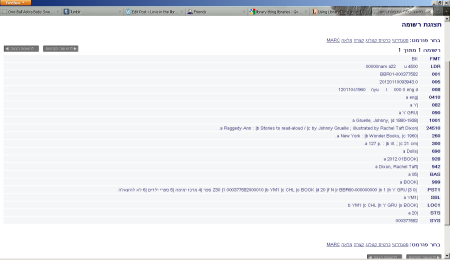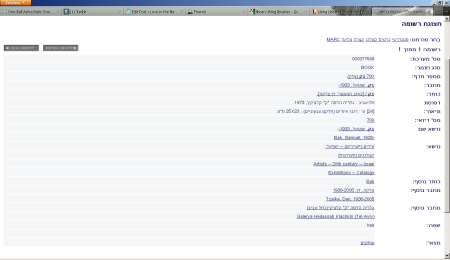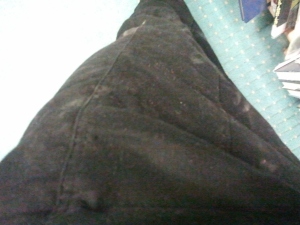As opposed to my stint in Acquisitions, during which I learned but I can’t say I had fun, I had a better time than I expected during my day in Cataloging.
The library director told me that my day in Cataloging (which also includes classification and indexing) would be much like my day in Acquisitions. If it was important not to let a novice make costly errors in Acquisitions, it was trebly so in the public face of the library, the catalog.
I started the morning with an explanation of how the catalog works in Aleph 500, starting from the basic entry created by the Acquisitions department. I think the cataloger was prepared for the standard library school student and was ready to explain what MARC fields are; I hope she was pleasantly surprised to find that I knew the basic fields and most of the indicators/subfields within the fields. It certainly made the teaching time shorter and more pleasant and led to the day being a lot more fun for me. Soon she was showing me how she catalogs, classifies, and indexes a book, and we were happily trading 008s and 040s and 651s and $a and $z and 04s.
Early on in the day I learned a very important trick which boosted my confidence about cataloging in Hebrew no end.
In Hebrew many words have alternate spellings, either defective or plene (inclusive or exclusive of matres lectionis). Standard policy until recently was that all bibliographic datasources — indices and catalogs — used defective spelling, without matres lectionis. Recently the trend has swung the other way, perhaps as a result of computerization and the increased use of these datasources by the public, who don’t want to be bothered with remembering what letters are included in defective spelling and what aren’t — they just want to type the word and find the result as easily as they do in Google. Since I’m not a native Hebrew speaker and I disliked my grade school Hebrew grammar teacher, I have no inborn sense of when a letter is just a letter and when it’s serving as a matre lectionis. But wonder of wonders — the cataloger showed me that she searches the National Library catalog and copies their spelling. I can do that!
I was surprised by how much copy cataloging there was, but in retrospect, I shouldn’t have been. In class we’re always being told to check the National Library, Bar Ilan, or Haifa University. I suppose I should have been surprised that there isn’t more consortia cataloging; each university and college catalogs on its own, and if they want to copy from each other, it is their own private secret. There is a national control, with Prof. Elchanan Adler sending libraries error reports before the local cataloging is passed over to the OCLC. (A side note — Prof. Adler is my hero, because like me he’s an American who came to Israel as an adult. Unlike me, he had a rock solid knowledge of LIS and of Hebrew grammar before he arrived. Well, I can try my best, can’t I?)
After I watched and listened to explanations of how the new books were cataloged and showed that I had some knowledge and was quick to learn, we moved on to taking care of corrections. Because of the move to plene spelling in place of defective, many books have had to be pulled from the shelves to correct author surnames. The classic exaample, taught in most of our classes, is the author Amos Oz. In Hebrew he spells his name עוז (which translates to “strength”), but since the ו us a matre lectionis, it was removed in defective spelling, leaving him עז (which translated to “goat”). As there is time in the cataloging schedule, authors like Oz are being allowed by the catalog to spell their names as they wish. However, that means books have to be pulled from shelves and re-Cuttered. At the same time, problems with the MARC coding and incomplete indexing is being fixed.
As I was not allowed to touch the catalog, what the cataloger very generously did was sit by her computer while I worked with the book, telling her which fields needed to be fixed and what fix needed to be made. In addition, she asked my opinion about some topics that arose in the indexing, such as a change from change 651 to 610 for concentration camps & ghettos and adding in English terms (LCSH) to match the Hebrew index terms.
I think I could happily catalog all day. There’s a level of precision demanded that satisfies me, and I’m used to working alone, in silence. Until I worked the reference desk, I was certain cataloging was where I’d try to get a job; now I know I’d be happy there, but I no longer feel it’s my only real option.
I’ll be doing another round of cataloging when I start the second section of my practicum in a different academic library where they will let me work in the catalog. It will be interesting to look back on this entry and see if my impressions still hold true.
Date: December 1, 2011
Hours: 6 hrs, 50 minutes
Total hours to date: 10 hours, 40 minutes



